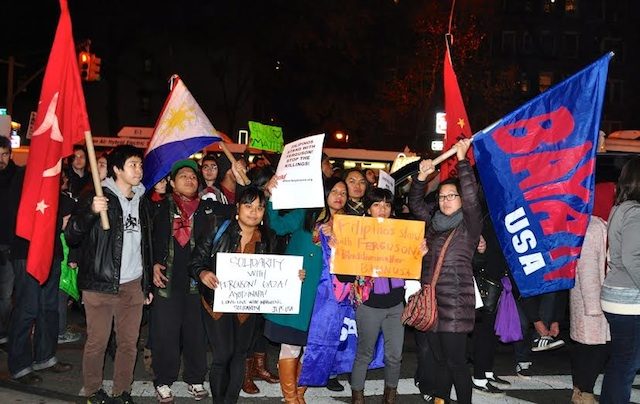SUMMARY
This is AI generated summarization, which may have errors. For context, always refer to the full article.

NEW YORK, USA (UPDATED) – “You use it for one purpose and it’s to stop the threat,” Joe Luistro, an Edison, New Jersey patrol police officer for 22 years and president of the New Jersey Asian American Law Enforcement Officers Association, said about using his gun in the line of duty.
The shooting of an unarmed black teenager, Michael Brown, by a white police officer, Darren Wilson, in Ferguson, Missouri, on August 9 has once again raised important questions about race in America, and brought to the forefront the issue of police brutality toward black community.
“It’s a very sensitive topic,” Luistro said of the Ferguson incident. “It is tough for us to speak about. We have been given specific guidelines about what we can say and cannot say.”
Luistro explained why a police officer would use his weapon.
“People have been asking why not either just shoot the leg or maim. From our training, if you have to resort to using your weapon, it is only for one purpose. You have to use what is necessary to make sure the threat is eliminated.”
Filipino American Luistro is among the 7 Asian American police officers in the Edison Police Department. Asian Americans make up about 45% of Edison’s population as of 2010 US census.
According to news website NJ.com, the Edison police department employs 7 Asian Americans and 7 African Americans with 2 Hispanics. The department is actually one of the more “forward-thinking” departments Robert May, the founder of the New Jersey Asian American Law Enforcement Officers Association, said he knows of.
(Editor’s note: A previous version of this story mistakenly attributed to Robert May the comment that Edison Police Department one of the “most diverse” police departments in the country. It did not come from him. That part of the story has been updated to reflect the correction. We apologize for the error.)

The color of their skin or the community they are patrolling, Luistro said, does not really come to play when it comes to policing. “If they are committing a crime, it is not about race. We don’t make it about race.”
But many have argued that police brutality, racial profiling and intimidation do exist in many communities, including in Asian communities but particularly in black communities. Ferguson has become a national symbol of racial injustice, according to protestors, including BAYAN USA president Bernadette Ellorin.
“We all should stand with the people of Ferguson, with the Brown family and all other African American parents who lost their sons to racist police violence and killings,” said Ellorin.
BAYAN USA-New York members joined the two-night protest action in Manhattan after the Missouri grand jury on November 24 decided to not indict Officer Wilson over the shooting death of 18-year-old Brown.
On the same night in Ferguson, another Filipino American, Kalayaan Mendoza, a senior organizer for Amnesty International, was working to keep the peace. His teams have been on the ground in Ferguson since the protests began in August, working with community leaders, residents and organizers to find how to best channel the community’s energy. According to the 2010 US census, African Americans make up 67.4% of the city’s population, 29.3% Caucasian and only .5% Asian, including 14 Filipinos.
“At one point, we were looking out and seeing all the smoke and saying, where are we?” Mendoza said of that explosive night after the announcement of the grand jury’s decision.
Mendoza said they were faced with challenges.

“There was no way to control the reaction since it has been building for months,” he said. “Seeing Mike Brown’s mom and hearing the crying and the screaming. When we heard the announcement, we got our gas masks and goggles, just to prepare based on our previous experience. Police fired tear gas, rubber bullets so we tried to prepare our team as much as possible. But you know what I saw over and over again, are the grandmothers and children who were washing people’s eyes and handing out water. And that night there were people situated in front of businesses to protect them as much as they could.”
Both Ellorin and Mendoza believe that what happened in Ferguson spills over in our own community.
“If we don’t stand up for this injustice,” Mendoza said, “how do we expect others to stand up for us. If we don’t see their humanity, how do we expect them to see our humanity. This is about us. This ties with our oppression.” – Rappler.com
Add a comment
How does this make you feel?
There are no comments yet. Add your comment to start the conversation.